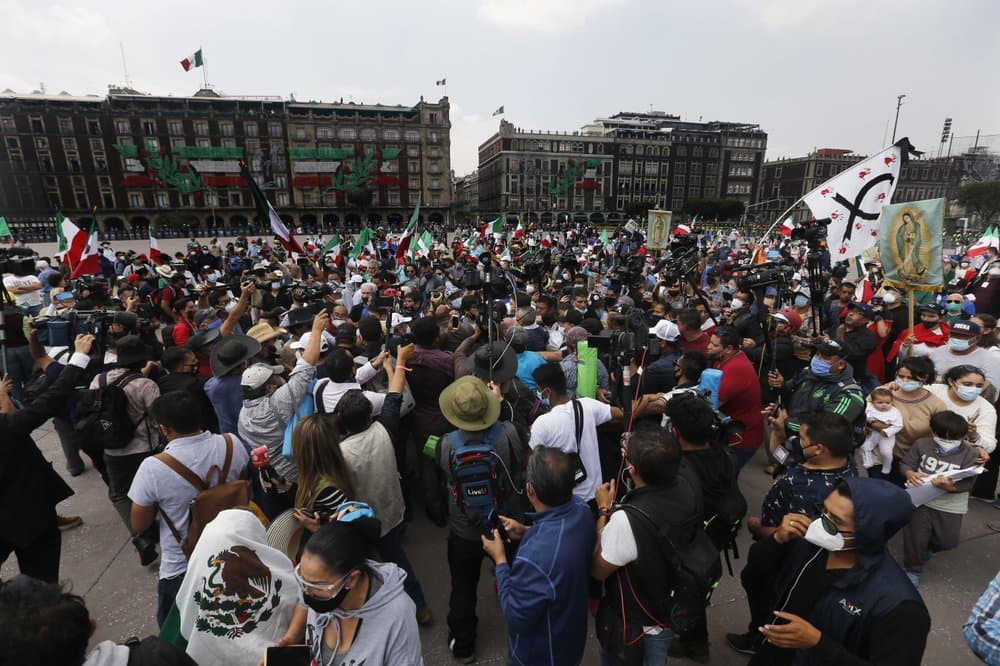MEXICO CITY — Mexican President Andrés Manuel López Obrador said Wednesday that conservative protesters demanding his resignation are welcome to camp out in Mexico City’s main plaza outside his offices in the colonial-era National Palace.
Police later allowed only a couple hundred protesters into the plaza, and kept them in the section farthest from the government palace.
López Obrador himself led numerous protest encampments in his decades as an opposition leader, and he offered some advice to the more novice opposition of today.
“Don’t play act,” López Obrador said during his morning news conference. “The (protest) leaders should stay to sleep” in the collection of hundreds of small tents that sprang up on an avenue leading to the plaza over the weekend after demonstrators complained that police blocked their attempt to march into the main plaza, known as the Zocalo.
On Wednesday, the protesters allowed into the plaza erected a few symbolic tents on one side of the vast, windswept expanse that since colonial times has been considered the heart of the city.
A line of police with shields blocked them from the half of the plaza in front of the palace. City officials argued that was needed to preserve social distancing and provide security. Officials were apparently worried that some of the president’s more ardent supporters might confront the protesters.
The president, who is better known by his initials as AMLO, suggested that only foot soldiers among the demonstrators were sleeping in the tents, an uncomfortable proposition in Mexico City’s rainy season.
The protest movement calls itself the National Anti-AMLO Front or FRENA, a contrived acronym that is also the Spanish word for “brake.” The leaders claim López Obrador has accumulated too much power, has ignored checks and balances and civic groups. They are also angered by his handling of the pandemic and its economic effects.
“This president is putting a brake on economic and political development, and he wants to establish communism in Mexico, and we are not going to allow that,” said Marta Huesca, 43, a vendor from Puebla state who was at the protest camp Tuesday with her husband and mother. “We are demanding what is right, and we are going to stay here until AMLO goes.”
“We are demanding his immediate resignation for ineptitude and lack of leadership,” Huesca said. The group appears to lean conservative Catholic, with some prayers and banners of the Virgin of Guadalupe, Mexico’s patroness.
On Sunday, the group complained that dozens of police blocked protesters from marching to the Zócalo and called it an attack on free speech. In fact, police have been limiting access to the plaza off and on since the coronavirus pandemic began as a way to enforce social distancing.
The protesters appear to be a little more well-heeled than those who manned communal tents for miles on the city’s main avenue for seven weeks in 2006 to protest what they claimed was electoral fraud that prevented López Obrador from winning in the first of his three runs for the presidency.
The conservative protesters sleep in their own individual or family-sized tents and appear to have a bit more camping gear that the pro-AMLO encampments of 2006 and others in the 1990s.
But it is also not clear that López Obrador followed his own advice. Toward the end of his seven-week-long encampment in 2006, many of the tents pitched along the city’s Reforma boulevard were actually empty.
While López Obrador no longer enjoys the overwhelming popularity he had after taking office in December 2018, he still appears to have the support of a majority of Mexicans. While the president espouses a policy of “the poor come first,” he is far from being a leftist in most traditional senses of the term, and leans more toward austerity, a hatred of corruption and fierce Mexican nationalism.
One of the protest leaders, Gilberto Lozano, told local media the demonstrators plan to establish a long-term, rotating presence in the protest encampments, with protesters from Mexico’s 32 states taking turns staying in the tents.











